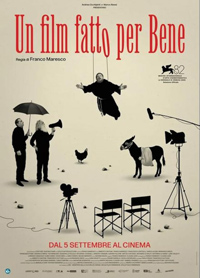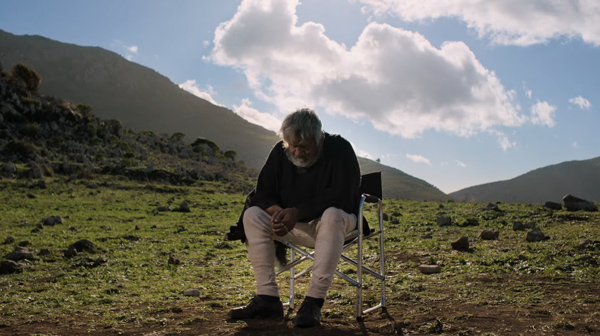Investigation of a Suspicious Citizen: Maresco Salvages Cinema
 “I am not interested in any filmmaker. I am not even interested in my own films…” said Carmelo Bene, the invisible subject floating around in the periphery of Bravo Bene! (aka Un film fatto per Bene). An avant-garde filmmaker/actor of Italian stage and screen, Bene’s life seemed to be a complimentary subject for another notable figure of contemporary Italian cinema, Franco Maresco. Both men were openly critical regarding the toxic influence of mediocrity and bureaucracy on cinema, sharing cynical, even nihilistic attitudes about life in general. However, we’re not here to learn about Carmelo Bene, but rather, a film that never was and never will be directed by Franco Maresco. Candidly showcasing how his own behavior sabotaged a project which likely would have revitalized his career and heightened his international acclaim, it’s a documentary about a depressed artist’s failed film project, a portrait in which he also recused himself from as we learn about the impressions he’s left and an industry which has turned their back on auteurs who prize artistry over economy.
“I am not interested in any filmmaker. I am not even interested in my own films…” said Carmelo Bene, the invisible subject floating around in the periphery of Bravo Bene! (aka Un film fatto per Bene). An avant-garde filmmaker/actor of Italian stage and screen, Bene’s life seemed to be a complimentary subject for another notable figure of contemporary Italian cinema, Franco Maresco. Both men were openly critical regarding the toxic influence of mediocrity and bureaucracy on cinema, sharing cynical, even nihilistic attitudes about life in general. However, we’re not here to learn about Carmelo Bene, but rather, a film that never was and never will be directed by Franco Maresco. Candidly showcasing how his own behavior sabotaged a project which likely would have revitalized his career and heightened his international acclaim, it’s a documentary about a depressed artist’s failed film project, a portrait in which he also recused himself from as we learn about the impressions he’s left and an industry which has turned their back on auteurs who prize artistry over economy.
For those who know nothing about Maresco or his body of work, Bravo Bene! strangely succeeds as a documentary biopic in orienting the audience’s understanding of the man, at least as a director who has had a formidable career in the Italian film industry. Pertinent highlights from his resume, including his early days in television on Cinico TV satirizing the violent escapades of 1980s Mafia controlled Palermo would lead to scandalous collaborations with Daniele Cipri, including with their incendiary 1998 title Toto Who Loved Twice.

After winning the Special Jury Prize at the 2019 Venice Film Festival for The Mafia Is No Longer What It Used To Be, his next major project was this Bene biopic, eventually halted indefinitely. And Maresco, in sometimes quite vulnerable terms, shows us why. The film opens with his longtime friend Umberto Cantone searching for the director, who seems to have disappeared following the shelving of his uncompleted film project. A host of curious individuals, including Maresco’s chauffeur, a religious zealot who seems perfectly attuned to his employer’s idiosyncrasies, begin to divulge personal attributes, almost all of which point to Maresco as being impossible to work with, but not because he was a tyrant.
Clearly suffering from obsessive compulsive behaviors, we first learn he insists on getting his haircut in a specific hotel room at the Hotel Europa in Palermo, but never on Friday, or other certain numbered days of the month (though his modern appearance is that of a hirsute man in the style of Michel Simon in Renoir’s Boudu Saved From Drowning, 1932). The cantankerous Umberto leads us to other figures associated with the Bene production, including producer Andrea Occhipinti, who Maresco seems to regard as a nemesis. Also on hand is his personal physician, who confirms Maresco’s behavioral and mental health issues, which clearly paved the way for the production’s chaotic undertaking, quickly going over budget with his insistence on shooting on film with endless takes in remote locations.
But then we get to examine extensive footage of what was shot, including an extensive sequence in black and white, resembling something like Pasolini’s version of The Flowers of St. Francis (1950). Despite its randomness, what was captured is sublimely cinematic. An additional interior dinner sequence, which features the actor hired to play Bene, looks like something set in a Fellini madhouse. Eventually, in a letter written from Maresco to his friend, the severe depression and apathy he was experiencing during production, along with the injury of one of the principals, suggested he may not ever have intended to complete the film in the first place (which doesn’t stop him from referring to the producers as committing ‘filmicide’).
Where Bravo Bene! really becomes its own odd but incredibly satisfying manifesto on the state of cinema today and its lapse into mediocrity is when Maresco shares his attempt to remount his Bene material for television, hiring a troupe of actors he would come to despise and abuse. In the midst of this, another figure from his past enters, Italian film critic Francesco Puma, a bloated, self-important rube who has since become popularized on Rai Television. Puma pops up, still hungering for fame as an actor and begging to be cast in the production, Maresco sees a devious opportunity to mess around with a man he refers to as the stupidest person he’s ever met. A contemptuous scenario unfolds so scathingly it succeeds in becoming the delirious comedic content reality television wishes it could be.
In keeping with something like Les Blank’s Burden of Dreams (1982) or Lost in La Mancha (2002), it’s a recuperation of an ambitious artist struggling within a restrictive, hypocritical system and ultimately against himself. The film is dedicated to essayist Goffredo Fofi, who passed away several weeks before the premiere, perhaps the only real compliment Maresco bestows on anyone. The world rarely makes space for nihilists to flourish, and when someone like a Franco Maresco stops struggling to carve such a space out for themselves, the world simply closes up around them.
Reviewed on September 5th at the 2025 Venice Film Festival (82nd edition) – In Competition. 100 Mins.
★★★★/☆☆☆☆☆


